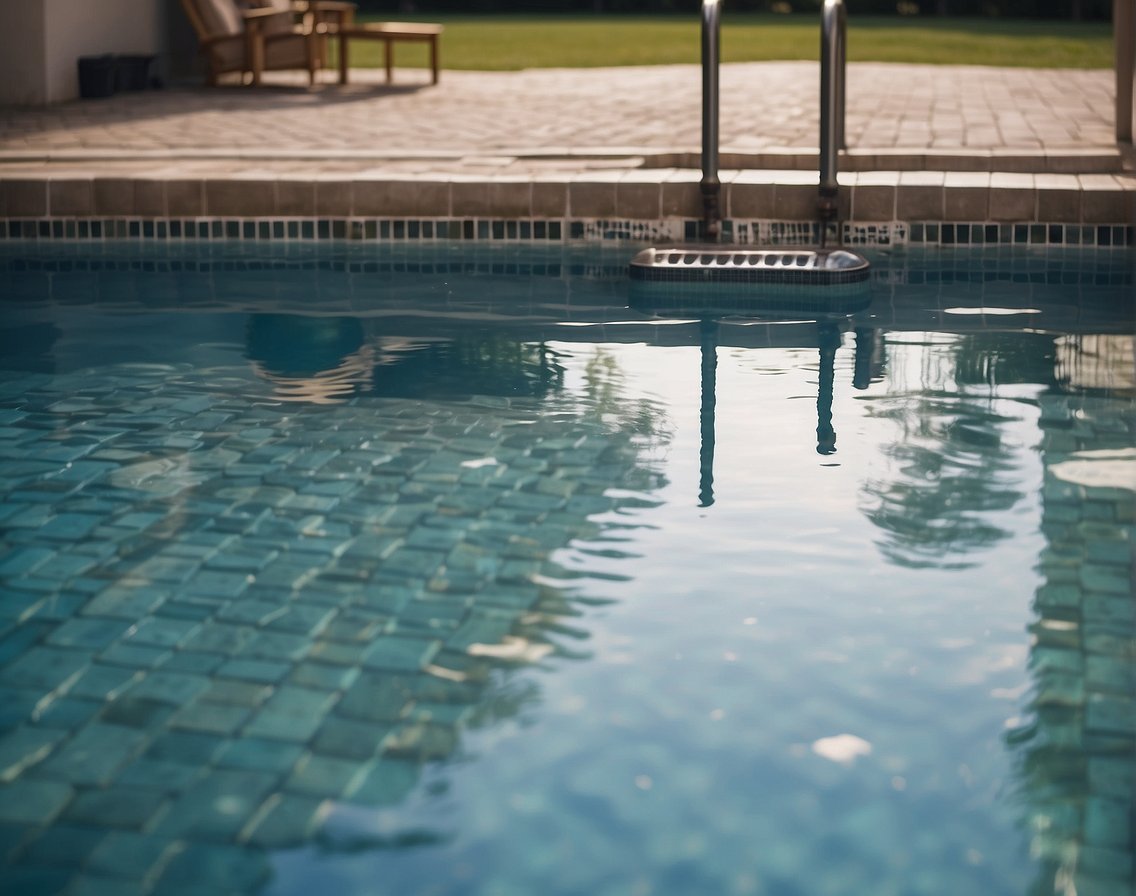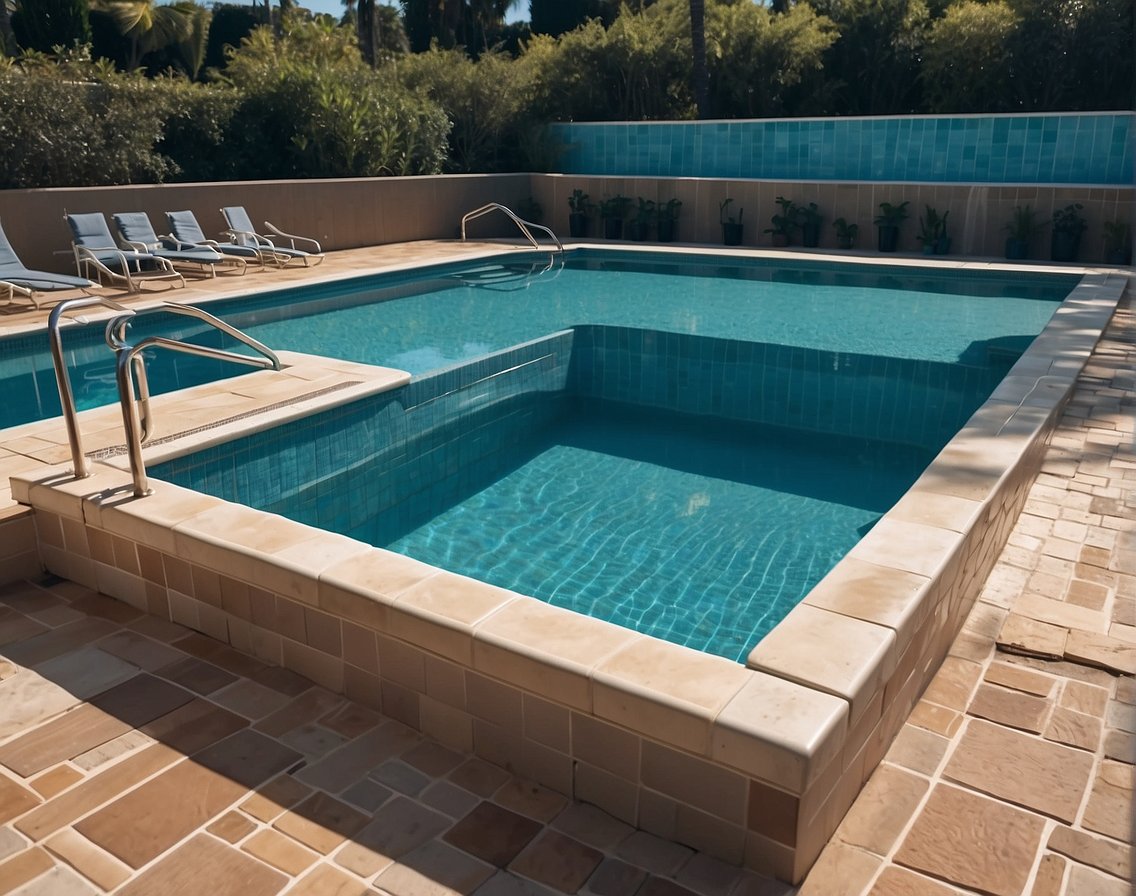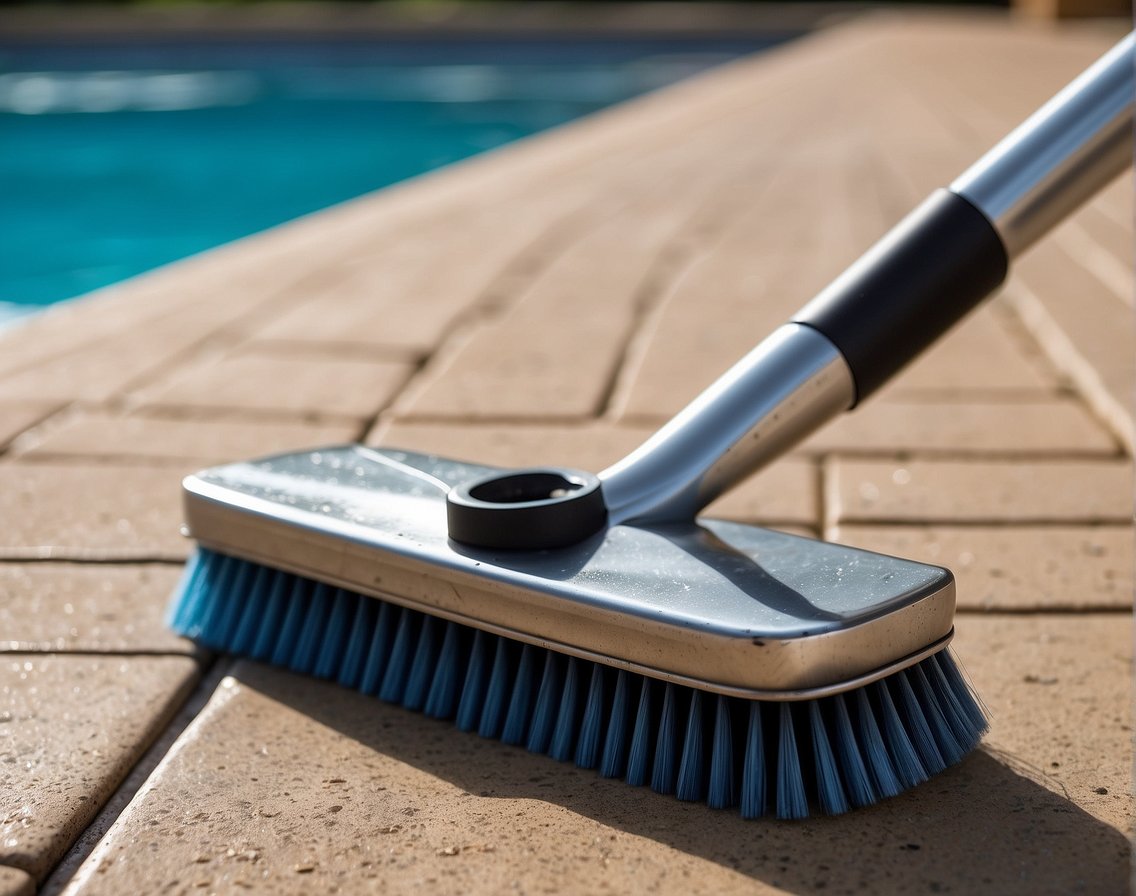Understanding Pool Contamination and Grout’s Role

In managing pool hygiene and aesthetics, we recognize the critical importance of grout. It’s integral both to maintaining water quality and to the structural integrity of the pool.
Significance of Clean Grout in Pool Hygiene
Clean grout is vital in preventing the growth of algae, bacteria, mold, and mildew, which pose significant health risks. In a swimming pool, grout acts as a sealant between tiles, but when it becomes compromised:
- Algae: Can quickly take root in grout, leading to slippery surfaces and cloudy water.
- Bacteria & Mold: Can proliferate in porous, unclean grout, affecting both water quality and swimmer health.
Maintaining the grout not only keeps the water safe and crystal clear, but also ensures that hygiene is upheld, safeguarding swimmers from potential infections.
Role of Grout in Pool Structure and Aesthetics
The integrity of a swimming pool’s structure largely depends on the condition of the grout:
- Structural Support: Grout provides stability, binding tiles and preventing water infiltration that could weaken the pool’s foundation.
- Aesthetic Appeal: A clean grout line enhances the pool’s appearance by giving it a pristine, well-maintained look.
Regular grout maintenance thus plays a critical role in preventing pool contamination and keeping the facility both safe and visually appealing.
Grout Maintenance for Pool Longevity

To ensure a clean and durable swimming environment, we focus on two main areas: routine inspections, cleaning, and preventative measures, alongside proper sealing techniques.
Routine Inspections and Cleaning
We perform regular inspections of the pool grout to catch any deterioration early. Our maintenance tips include:
- Weekly Checks: We examine the grout lines for cracks, chips, or discoloration.
- Cleaning Regimen:
- Monthly: We clean the grout using pH-neutral cleaners to remove dirt and debris.
- Bi-Annual Deep Clean: We use specialized grout cleaners to remove calcium and mineral deposits.
For different types of grout, such as epoxy, cement-based, sanded, and waterproof grout, we adjust our cleaning methods to match their unique needs.
Preventative Measures and Sealing
We implement preventative measures to extend the pool grout’s lifespan. Our approach includes:
- Grout Sealer Application:
- We apply a high-quality grout sealer annually to waterproof grout lines and protect against chlorine damage.
- We choose sealers that enhance the durability and lifespan of the grout.
- Chlorine Level Management:
- We maintain proper chlorine levels to prevent algae growth while avoiding excessive exposure, which can degrade grout integrity.
Sealing grout, particularly in a pool setting, is vital to preserving its condition and functionality. Our sealing practices are designed to offer both protection and longevity.
Effective Cleaning Techniques for Grout

When we approach cleaning pool grout, it’s essential to select suitable cleaners and tools, as well as to follow a structured guide.
Choosing the Right Cleaning Agents and Tools
It’s crucial that we choose the right cleaning agents and tools for the job. We must ensure compatibility with pool tile to avoid damage. For routine cleaning, a solution of vinegar and water, or baking soda mixed with water, can effectively clean grout without introducing harsh chemicals into the pool environment. However, for tougher stains, a grout cleaner containing hydrogen peroxide can be used, which has the capability to break down organic stains without being too abrasive.
Selecting tools is just as important. A sturdy scrub brush is the primary tool we’ll need for the scrubbing action, but we must also make sure to wear the appropriate personal protective equipment (PPE), including safety goggles and gloves, to protect ourselves during the cleaning process. For extensive or deep cleaning across the entire pool, we might consider wielding a pressure washer for efficiency, but we have to use it with care to avoid damaging the grout.
Step-By-Step Guide to Cleaning Pool Grout
Cleaning pool grout involves a series of steps to ensure thoroughness and efficacy:
- Prepare the Area: Remove any debris from the pool tiles before starting the cleaning process.
- Apply Cleaning Solution: Use the chosen cleaner (vinegar and water, baking soda mixture, or a commercial grout cleaner) to cover the grout lines.
- Let it Sit: Allow the solution to penetrate the dirt and stains by letting it sit for a few minutes.
- Scrub the Grout: Using the scrub brush, firmly scrub the grout lines to loosen and remove buildup.
- Rinse Thoroughly: After scrubbing, rinse the area well with clean water to remove any remaining cleaning solution and loosened debris.
- Inspect and Repeat if Necessary: Inspect the grout lines for any remaining stains. If they persist, repeat the scrubbing process, possibly with a stronger cleaning agent.
- Dry and Review: Allow the grout and tiles to dry fully to assess if the cleaning process has been entirely successful.
By adhering to these steps, we ensure a clean pool environment that minimizes the risk of contamination, maintains aesthetic appeal, and extends the longevity of the pool’s structural integrity.
Operational Best Practices and Safety Measures
In maintaining pool hygiene and safety, it’s crucial to adhere strictly to standardized operational practices and safety measures. Our focus is to eliminate the risk of contamination through meticulous grout cleaning and the careful handling of pool chemicals, while ensuring the safety of all personnel involved in the maintenance process.
Pool Chemical Handling and Application
We understand the significance of proper pool chemical usage, especially when disinfecting with chlorine tablets and bromine. Our maintenance routine for chemical handling and application includes:
- Storage: Store chemicals in a cool, dry place with adequate ventilation to prevent the buildup of fumes.
- Use: Follow the manufacturer’s instructions for the correct amounts and methods of chemical application to avoid over or under-chlorination.
- Safety Measures:
- Ventilation: Ensure there’s sufficient air flow where chemicals are handled to mitigate inhalation risks.
- PPE: Utilize gloves and safety goggles consistently to protect against chemical splashes and fumes.
Importance of Personal Protective Equipment
We prioritize our health and safety when performing maintenance tasks. Personal Protective Equipment (PPE) is non-negotiable in our operational protocols.
- Usage: Equip ourselves with appropriate PPE which includes gloves, safety goggles, and respirators if necessary, before engaging in pool maintenance, especially during grout cleaning and chemical handling.
- Maintenance: Inspect and replace our PPE regularly to maintain its protective quality and ensure cleanliness.
By upholding these practices, we reinforce our commitment to safety and cleanliness, optimizing the pool environment while safeguarding those responsible for its upkeep.
Frequently Asked Questions
Grout plays a crucial role in maintaining the cleanliness and health of pool water. It’s important to understand its impact and how to properly care for it.
How does grout condition impact pool water quality?
The condition of grout significantly affects water quality in pools. If grout is compromised, contaminants can seep into the tile joints and lead to water contamination. This underscores the importance of regular inspections and maintenance.
Can deteriorating grout contribute to algae growth in pools?
Yes, deteriorating grout can harbor algae, providing it with crevices to grow. When grout loses its integrity, it can become a breeding ground for algae, which negatively impacts pool water clarity and health.
What are the best practices for maintaining grout in swimming pool areas?
Best practices involve regular cleaning, prompt repair of cracks, and the application of a sealant for protection. This routine helps preserve grout condition and prevents water from becoming contaminated by materials that may come loose.
How often should grout be cleaned to maintain pool hygiene?
Grout should be cleaned at least twice a year; more frequently if the pool has heavy usage or is exposed to high levels of debris. This cleaning frequency helps to maintain hygienic conditions and extend the life of the pool surfaces.
What cleaning solutions are recommended for pool grout without damaging it?
We recommend using pH-neutral cleaning solutions specifically designed for pool grout. This ensures effective cleaning without causing harm to the grout or the surrounding pool materials.
How can properly maintained grout prevent bacteria buildup in swimming pools?
Properly maintained grout is less porous and more resistant to bacteria infiltration. Regular cleaning and sealing create a barrier that minimizes the chances of bacteria buildup, keeping the pool sanitary and safe for users.
